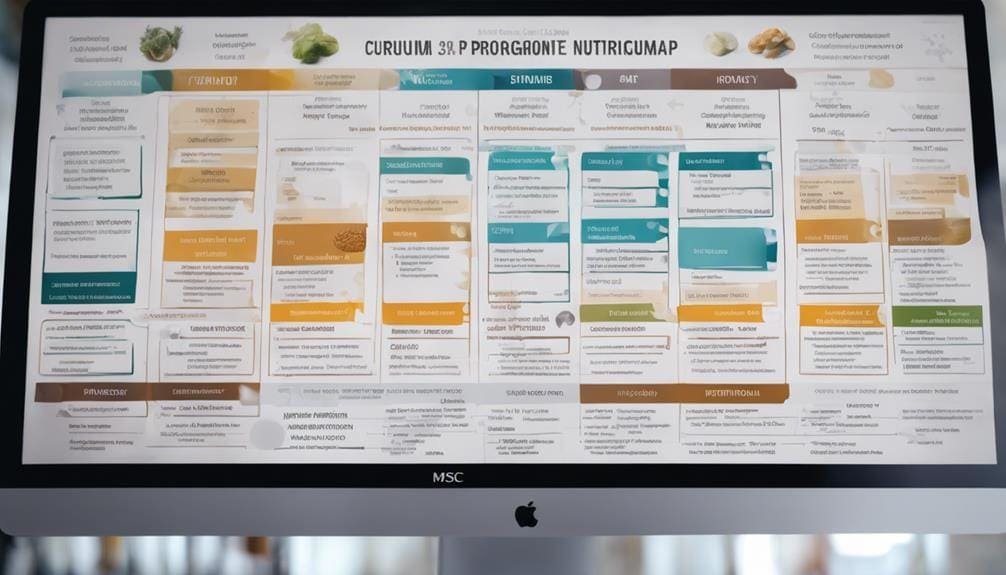We understand that the field of nutrigenomics may seem intimidating due to its complex blend of genetics and nutrition; however, the MSc Nutrigenomics program at Manchester University offers a structured approach that demystifies this intricate relationship.
As we explore the depths of how our genes influence our dietary requirements, a world of possibilities opens up for those passionate about unraveling the mysteries of personalized nutrition.
Join us in uncovering how this program equips individuals with the tools to revolutionize the way we understand and approach nutrition on a molecular level.
Program Overview
In this program, we delve into the intricate relationship between genes and dietary responses, providing a comprehensive understanding of nutrigenomics. The Master of Science in Nutrigenomics at Manchester University is designed to equip aspiring Registered Dietitian Nutritionists with the knowledge and skills needed to navigate the intersection of nutrition and genetics. This program blends the fields of nutrition and science, offering a unique opportunity to explore how our genes influence our dietary needs and responses.
At Manchester University, the Nutrigenomics Program stands out for its specialized focus on training Registered Dietitian Nutritionists. Students in this program not only gain a deep understanding of the scientific principles underpinning nutrigenomics but also learn how to apply this knowledge in a practical setting to optimize dietary interventions for individuals based on their genetic makeup.
The curriculum of the Master of Science in Nutrigenomics program is carefully crafted to cover a range of topics, including genetics, biochemistry, nutrition, and research methodologies. Students engage in hands-on learning experiences, research projects, and practical case studies to deepen their understanding of how genetic variations can impact dietary requirements and responses.
Career Opportunities

Exploring the field of nutrigenomics opens up a spectrum of career opportunities for graduates of the MSc program, ranging from positions in academic institutions and healthcare settings to roles in governmental and non-governmental organizations specializing in personalized nutrition.
The program equips students with the necessary skills to understand the intricate relationship between gene expression, nutrition, and health outcomes. Graduates are well-prepared to embark on career paths focused on preventing and treating chronic diseases through personalized nutrition interventions.
With a deep understanding of how individual genetic makeup influences responses to diet, graduates can pursue roles where they contribute to enhancing people's lives through tailored nutrition plans. The program's emphasis on laboratory techniques ensures that graduates are proficient in conducting research that informs personalized nutrition recommendations.
This expertise opens doors to diverse job opportunities in universities, hospitals, and research institutes, as well as in governmental and non-governmental organizations dedicated to advancing personalized nutrition initiatives.
Curriculum Details

Our program's curriculum in MSc Nutrigenomics incorporates a comprehensive range of courses focusing on nutrigenomics, personalized nutrition, and genetic sequencing. Students in the University's Master of Science in Nutrition and Nutrigenomics Program delve into the intricate relationship between genes, diet, and health outcomes. The curriculum is designed to equip students with the knowledge and skills to understand how genetic variations impact individual responses to nutrients, enabling them to provide personalized dietary recommendations.
| Course | Description | Emphasis |
|---|---|---|
| Nutrigenomics | Explores how nutrients interact with genes and how this interaction influences health and disease outcomes. | Understanding gene-diet interactions. |
| Personalized Nutrition | Focuses on tailoring diet recommendations based on an individual's genetic makeup, lifestyle, and health status. | Applying genomic knowledge to personalize diets. |
| Genetic Sequencing | Covers the techniques and applications of genetic sequencing in understanding an individual's genetic predispositions to certain diseases. | Utilizing genetic data for health recommendations. |
| Molecular Nutrition | Examines the impact of nutrients at the molecular level on gene expression and metabolic pathways, leading to personalized dietary approaches. | Applying molecular insights to personalized diets. |
The program also includes training in bioinformatics, molecular nutrition, and nutrigenetic testing, providing practical experience in research labs and exposure to advanced instruments. This holistic approach prepares students to make a meaningful impact in the field by translating genomics knowledge into tailored dietary interventions for improved health outcomes.
Accreditation Information

Accreditation by the Accreditation Council for Education in Nutrition and Dietetics (ACEND) signifies adherence to high standards of quality and rigor in the MSc Nutrigenomics program. This accreditation is crucial as it ensures that the program meets the necessary criteria for excellence in education and program credibility. Graduates of an accredited program are also eligible to take the registered dietitian nutritionist exam, a significant step towards becoming a registered dietitian nutritionist.
ACEND accreditation: The ACEND accreditation is a stamp of approval that the MSc Nutrigenomics program has met the rigorous standards set by the accrediting body.
Quality and rigor: Accreditation guarantees that the program maintains high-quality education and rigorous standards, preparing students for success in the field of nutrigenomics.
Program credibility: ACEND accreditation enhances the credibility and recognition of the program, showcasing its commitment to providing a top-tier education in the field of nutrition and dietetics.
Application Process

Moving from the critical aspect of meeting accreditation standards, the application process for the Master of Science in Nutrigenomics at Manchester University requires careful attention to specific deadlines and submission criteria. The application typically opens annually between July 24 and July 1, with prerequisite coursework completion by August 1 being necessary for consideration. Unfortunately, international students are currently ineligible for admission due to program approval restrictions.
To streamline the process, all application materials must be submitted through the Dietetic Internship Centralized Application Service (DICAS). Prospective students should hold a bachelor's degree from a regionally accredited institution, with a preferred minimum GPA of 2.7 on a 4.0 scale to meet admission requirements. Below is a table summarizing key aspects of the application process:
| Application Process Key Points | Details |
|---|---|
| Application Period | July 1 – July 24 |
| Prerequisite Coursework Deadline | August 1 |
| Eligibility for International Students | Currently ineligible |
| Submission Platform | DICAS |
| Admission Requirements | Bachelor's degree, GPA 2.7 |
Frequently Asked Questions
What Are the Potential Ethical Implications of Using Nutrigenomics in Personalized Nutrition Plans?
Privacy concerns, genetic testing, informed consent, data security, dietary recommendations, and cultural implications form the ethical landscape of nutrigenomics in personalized nutrition. We prioritize safeguarding data, ensuring equity, and transparent communication.
How Does the Field of Nutrigenomics Differ From Traditional Nutrition Science?
Nutrigenomics, unlike traditional nutrition science, tailors dietary advice to individuals based on genetic predispositions. It integrates genetic testing, personalized diets, and precision nutrition to optimize health outcomes through understanding nutrient interactions and gene expression.
Are There Any Ongoing Research Projects or Collaborations Related to Nutrigenomics at the Institution?
We're actively engaged in various research projects and collaborations exploring genetic variations' impact on dietary responses. Our focus includes developing personalized nutrition interventions, utilizing bioinformatics to inform clinical applications, and enhancing public health through nutrigenomics.
How Does the Program Incorporate Hands-On Experience or Practical Applications of Nutrigenomics Concepts?
Incorporating hands-on experiences, our program delves into practical applications of nutrigenomics through lab simulations, case studies, and research projects. Students engage in clinical trials, gaining valuable insights into applying nutrigenomics concepts in real-world scenarios.
What Are Some Emerging Trends or Advancements in the Field of Nutrigenomics That Students Should Be Aware Of?
Gene variations influence dietary interventions and clinical applications in nutrigenomics. Microbiome interactions impact precision nutrition. Understanding these trends informs tailored recommendations. Future implications include personalized health strategies based on genetic profiles for optimal well-being.
Conclusion
In conclusion, the MSc Nutrigenomics program at Manchester University is like a finely tuned orchestra, harmonizing genes and food responses to create personalized nutrition solutions.
With a strong foundation in cutting-edge research and practical skills, graduates are equipped to lead the charge in revolutionizing dietary approaches and improving health outcomes.
The program's accreditation and diverse career opportunities make it a standout choice for those passionate about making a meaningful impact in the field of nutrition.
